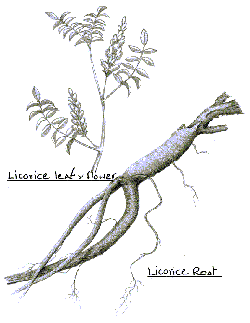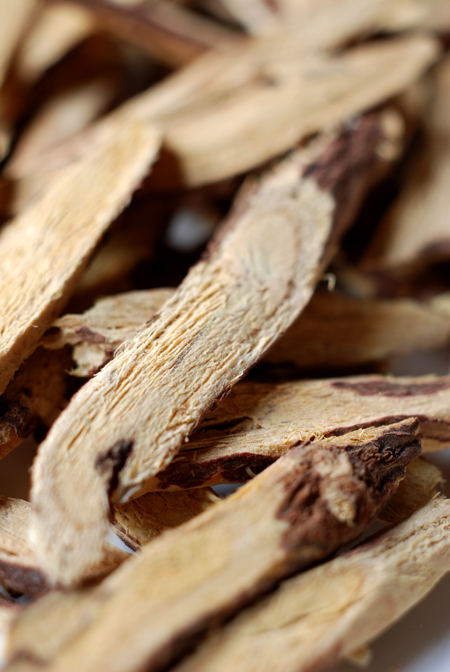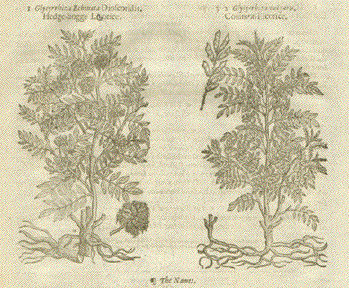|
|
|
#1 |
|
Guest
Posts: n/a
|
Licorice Root: Candy's good for you.
 University of Maryland Medical Center http://www.umm.edu/altmed/articles/licorice-000262.htm Also listed as: Glycyrrhiza glabra; Spanish licorice; Sweet root Licorice ( Glycyrrhiza glabra ) is a flavorful herb that has been used in food and medicinal remedies for thousands of years. Also known as "sweet root," licorice root contains a compound that is roughly 50 times sweeter than sugar. Common cold, liver disease... Licorice root has been used in both Eastern and Western medicine to treat a variety of illnesses ranging from the common cold to liver disease. Phlegm... This herb has long been valued as a demulcent (soothing, coating agent) and expectorant (rids phlegm and mucous from the respiratory tract) and continues to be used by health care professionals today to relieve respiratory ailments (such as allergies, bronchitis, colds, sore throats, and tuberculosis), stomach problems (including heartburn from reflux), inflammatory disorders, skin diseases, stress relief, and liver problems. Plant Description Licorice grows wild in some parts of Europe and Asia. A perennial that grows 3 - 7 feet high, licorice has an extensive branching root system. The roots are straight pieces of wrinkled, fibrous wood, which are long and cylindrical (round) and grow horizontally underground. Licorice roots are brown on the outside and yellow on the inside. Licorice supplements are made from the roots and underground stems of the plant. Stomach ulcers... Licorice root is often used to prevent and treat stomach ulcers. In fact, health care practitioners in Europe and Japan often prescribe a synthetic form of licorice for stomach ulcers. Although this drug is not available in the United States, many health care providers use deglycyrrhizinated licorice in gastric ulcers (DGL) with positive results. Deglycyrrhizinated licorice is a licorice supplement in which the component glycyrrhizin is removed. Glycyrrhizin has been reported to cause increases in blood pressure. Animal studies and early trials in humans support the value of licorice for stomach ulcers. One animal study recently found that aspirin coated with licorice reduced the number of ulcers in rats by 50%. (High doses of aspirin often cause ulcers in rats). Earlier studies in humans have found that preparations containing glycyrrhizin (an active compound in licorice) may be as effective as leading anti-ulcer medications in relieving pain associated with stomach ulcers and preventing the ulcers from recurring. In one study, licorice root fluid extract was used to treat 100 patients with stomach ulcers (of which 86 had not improved from conventional medication) for 6 weeks. Ninety percent of patients improved; ulcers totally disappeared in 22 of these patients. Heart disease... Emerging studies are beginning to suggest that licorice may also play a role in the treatment of heart disease. In one recent study, people with high cholesterol experienced a significant reduction in total cholesterol, LDL ("bad") cholesterol, and triglyceride levels after taking licorice root extracts for 1 month. The extract also reduced systolic blood pressure by 10%, although licorice may increase blood pressure in some individuals. These measures returned to their previous, elevated levels when the participants stopped taking the licorice supplements. Earlier studies in mice produced similar results. Licorice root extract reduced the risk of atherosclerosis ("hardening of the arteries") in these animals. HIV... Preliminary studies also suggest that licorice may play a role in the treatment of human immunodeficiency virus (HIV). One early study of only 3 people with HIV suggested that intravenous glycyrrhizin may prevent replication of HIV, but larger studies have yet to duplicate these findings. A laboratory study found that glycyrrhizin (a component found in licorice) inhibited the growth of Japanese encephalitis virus in test tubes, but further studies in humans are needed to confirm these preliminary findings. Experimental studies also suggest that active compounds in licorice may have estrogen-like effects. It is not clear at this time whether such effects are helpful or harmful to people with breast cancer. A recent human study found that a preparation of licorice may reduce body fat. Fifteen normal-weight subjects consumed licorice for 2 months (3.5 g a day). Body fat mass was measured before and after treatment. Licorice was able to reduce body fat mass and to suppress the hormone aldosterone. Another study found that a topical preparation of glycyrrhetinic acid (a component of licorice) was able to reduce the thickness of fat on the thigh in human subjects. PMS/Menopause, Depression, Memory & Cognition... Human studies have also found that licorice supplements may act as a "phytoestrogen" in the body, meaning licorice may have effects like that of estrogen. It was found that licorice decreased symptoms of PMS and menopause, including mild depression. Recent laboratory studies found that licorice may also improve memory and cognition. Despite these promising findings, there is ongoing debate in the scientific community regarding the value and side effects of licorice products. People who regularly consume large amounts of licorice (more than 20 g/day) may inadvertently raise blood levels of the hormone aldosterone, which can cause serious side effects, including headache, high blood pressure, and heart problems. Further studies are needed. Adrenal glands, inflammation reduction... Glycyrrhizin, one of the main components found in licorice, is believed to contribute to the herb's healing properties. Laboratory studies have reported that glycyrrhizin reduces inflammation, promotes secretion of mucous (usually through coughing), soothes irritation, protects the stomach and gastrointestinal tract, and stimulates the activity of the adrenal glands (regulates cortisol, the stress hormone). The roots also contain coumarins, flavonoids, volatile oils, and plant sterols. Pediatric... For sore throat treatment in older children, a piece of licorice root may be chewed or licorice tea may be used. The appropriate dose of tea for a child should be determined by adjusting the recommended adult dose to account for the child's weight. Most herbal dosages for adults are calculated on the basis of a 150 lb (70 kg) adult. Therefore, if the child weighs 50 lb (20 - 25 kg), the appropriate dose of licorice for this child would be 1/3 of the adult dosage. Prescaution: Don't Eat 1000 Plants At Once. Licorice consumption may cause serious side effects. Too much of the component glycyrrhizin causes a condition called pseudoaldosteronism, which can cause an individual to become overly sensitive to a hormone in the adrenal cortex. This condition can lead to headaches, fatigue, high blood pressure, and even heart attacks. It may also cause water retention, which can lead to leg swelling and other problems. An overdose of glycyrrhizin can lead to harmful conditions such as high blood pressure and even heart attack. indicator: raises blood pressure, so if you have high blood pressure already = not good. I personally wouldn't use it medicinally if I were pregnant/nursing, because it speeds baby up too. ************************************************** *** tea, plant, extract, dried root, photo      ************************************************** **** Antique woodcuts by John Gerard from his "Herball" published in 1597. The entire work contines text about the medicinal uses of each plant. Gerard was a botanist and apothecary and cultivated his own extensive garden in England.  http://www.raremaps.de/gerardbotanicals.html ************************************************** **** National Licorice Company  ************************************************** *** Chemopreventive properties of the ethanol extract of chinese licorice () root: induction of apoptosis and G1 cell cycle arrest in MCF-7 human breast cancer cells Cancer Letters, Volume 230, Issue 2, Pages 239-247 E.Jo, S.Kim, J.Ra, S.Kim, S.Cho, J.Jung, S.Yang, J.Park, J.Hwang, O.Aruoma Abstract Much of the interest on the chemopreventive properties of licorice has been focused on the plant genius Glycyrrhiza glabra. In this study the ethanol extract of Chinese licorice root, Glycyrrhiza uralensis (G. uralensis) was investigated for its estrogenic effect and the ability to inhibit cell proliferation in the MCF-7 human breast cancer cell line. The extract of the root of G. uralensis was fractionated in EtOH:H2O (80:20) (80% ethanol). The extract exhibited estrogenic effects similar to 17β- estradiol (E2) and induced apoptosis at the same dose level (100μg/ml) in MCF-7 breast cancer cells, results were associated with up-regulation of tumor suppressor gene p53 and pro-apoptotic protein Bax. G. uralensis extract caused the up-regulation of p21waf1/cip1 and down-regulation of cdk 2 and cyclin E and most significantly, induced G1 cell cycle arrest. This is the first study to show that the ethanolic extract of the root of G. uralensis has an estrogen-like activity and anti-cancer effects against MCF-7 human breast cancer cells. Whilst the use of phytoestrogens to protect against hormone-dependent cancers or as a ‘natural’ alternative to hormone replacement therapy remains controversial, the data in this paper support the suggestion that extracts of root of the Chinese licorice G. uralensis might be of importance in this debate.  ************************************************** ****** Tooth decay... Here’s a candy that’s sure to be a hit with kids (and their parents): a lollipop that fights tooth decay! It’s sugar-free, and contains an extract of licorice root (Glycyrrhiza uralensis) which kills the primary bacteria responsible for tooth decay (Streptococccus mutans).  [Professor Wenyuan Shi] determined that an extract of licorice root (Glycyrrhiza uralensis) is effective against tooth-decaying bacteria, providing the scientific basis for the ancient practice of chewing licorice root. “This was particularly charming because in both Chinese and in Western cultures, people have been chewing it maybe for the taste, but it also has a lot of good health reasons. It stimulates saliva flows, has anti-bacterial properties and keeps bacteria from adhering to your teeth”, explained Professor Shi. C3 Jian is currently working with a candy manufacturer on the healthy lollipop’s production. It is recommended to eat one lollipop after breakfast and another one before going to bed at night for a period of ten days. Then, in order to maintain the treatment’s effectiveness, one should eat a lollipop about 2-4 times a year. ************************************************** **** 1-oz bag of Licorice Root. Medicinal Properties: Helps in adrenal deficiency, endocrine support, stress, fatigue, general debility, regulates blood sugar, allergies, coughs, colds, digestive aid, ulcers, sore throat, hoarseness, bronchitis, menopausal symptoms, menstrual irregularities, and arthritis. ** Notes: Avoid during Pregnancy and nursing. Avoid if you have high blood pressure. Magickal Properties: Grants the bearer control over a person or situation. Used in Commanding Oil. 1.10 per oz  http://www.riverbirchcreations.com/c...0.html3.0.html ************************************************** ****  http://www.thenutfactory.com/section...candy-licorice The Nut Factory PO Box 815 Greenacres, WA 99016 Black Kukabara Licorice The Australian favorite. This licorice has a full flavor that is strong and enjoyable. It is made in a twist rope form which is very unusual and much more expensive to manufacture! ************************************************** ***** This brief look doesn't cover the fennel and other blends. The Best Pure Licorice Dance IMO: 
|

|
|
|
#2 |
|
Avalon Senior Member
Join Date: Sep 2008
Posts: 345
|
Be aware that licorice can cause blood pressures to go high and give you a head ache. If you try this and it does, there are options to licorice.
H. pylori bacter can be tested for and if there is evidence of it along with stomach issues, then try licorice first, but watch the blood pressure or symptoms (headache). There are three ways to test for H. phylori bacter, I prefer the least invasive saliva test. It is important to also know that a blood test may not show that H. pylori is still present after a round of antibiotics but could still be in the gut. |
|
|

|
 |
«
Previous Thread
|
Next Thread
»
| Thread Tools | |
| Display Modes | |
|
|
All times are GMT. The time now is 01:16 AM.





 Linear Mode
Linear Mode

